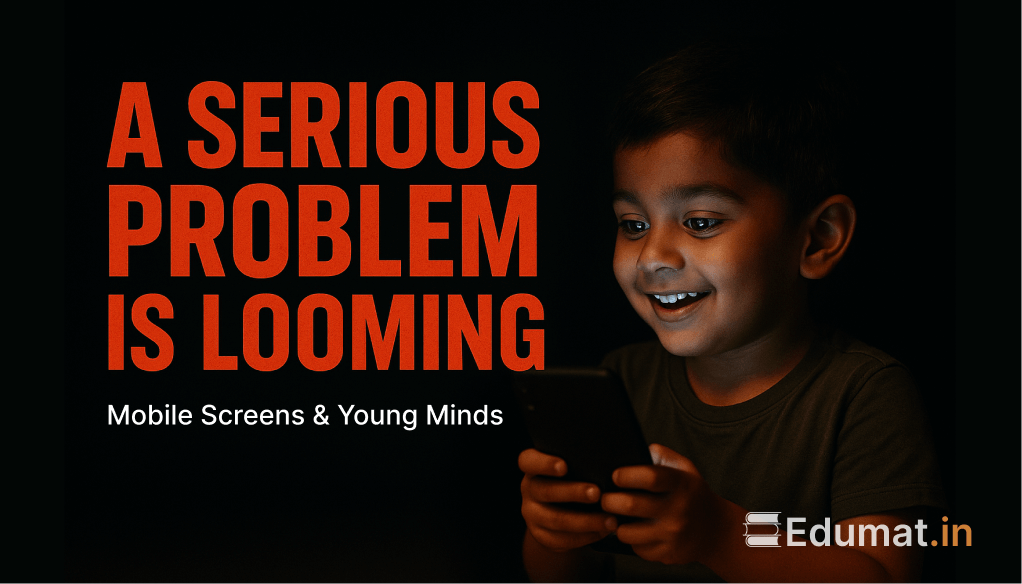📱 Mobile Screens & Young Minds: How Screen Time Affects Kids
Parenting • June 18, 2025

Mukesh Juadi

In today’s digital world, mobile phones, tablets, and smart TVs have become part of everyday life-even for toddlers and preschoolers. But as screens slowly turn into babysitters and best friends for kids, it’s time for every parent to stop and ask:
“What is this really doing to my child’s brain, emotions, and overall development?”
Let’s break it down-what science says about screen time for young kids, what risks are involved, and how parents can make smarter, healthier choices.
1. Brain & Cognitive Development
🧩 These Are the Building Years
Between ages 2 to 10, a child’s brain is growing faster than it ever will again. This is when they build memory, attention, reasoning, and control over their emotions.
But too much screen time can actually interrupt how their brain wires itself.
🔬 What research shows:
- MRI scans have found that kids who use screens for more than 1 hour a day show less white matter development—which is vital for language, reading, and thinking.
- Fast visuals and quick-cut content like cartoons or mobile games can train their brains to crave instant gratification—resulting in shorter attention spans and poor focus.
✅ What you can do:
- Limit screen time to under 1 hour/day for this age group.
- Choose slow-paced, educational content that encourages your child to think—not just watch.
- Watch together! Ask questions and talk about what’s on screen to turn it into a learning experience.
2. Language & Communication
📉 Screens Can’t Replace Real Conversation
Kids learn to talk by hearing and speaking with real people. Watching a cartoon character speak doesn’t build vocabulary like chatting with a parent or friend.
⚠️ The risks:
- Kids who use screens for 2+ hours/day are twice as likely to experience delayed speech and smaller vocabulary.
- Less time talking with family = fewer opportunities to learn communication.
✅ Parent Tips:
- Use screen time as a shared activity—ask questions, name things, explain what’s happening.
- Read books, tell stories, and encourage pretend play-these build language better than any app.
3. Social & Emotional Skills
😶 Real Emotions Can’t Be Learned From Screens
Empathy, patience, and self-control are learned by watching and interacting with real people—not from staring at a screen.
📉 What happens with too much screen time:
- Kids may become socially withdrawn, aggressive, or have difficulty making friends.
- They might struggle with understanding emotions, sharing, or resolving conflicts.
✅ What helps:
- Plan screen-free playtimes daily—drawing, toys, outdoor games.
- Try group activities or family roleplay games to teach interaction and cooperation.
4. Sleep Disturbance
🌙 Screens and Sleep Don’t Mix
If your child is falling asleep with a phone in hand or after long YouTube sessions—it’s time to worry.
Here’s what happens:
- Blue light from screens delays melatonin (the sleep hormone), making it harder to fall asleep.
- Kids sleep less, wake up tired, and become irritable or unfocused the next day.
✅ Create a healthy bedtime routine:
- Make bedtime a no-screen zone—no screens at least 1 hour before bed.
- Replace screens with storytelling, soft music, or cuddly book reading.
5. Mental Health Impact
Too much screen time doesn’t just affect behavior—it affects emotions too.
🚨 Common problems include:
- Anxiety, irritability, and sadness
- Restlessness and hyperactivity (often mistaken for ADHD)
- Dependency on screens to feel comforted, leading to digital addiction later in life
✅ What you can do:
- Allow kids to talk about feelings openly—teach them it’s okay to be bored or upset.
- Don’t use screens as a solution for tantrums—teach breathing, counting, or naming emotions.
- Celebrate non-screen hobbies like dancing, painting, or nature walks.
6. Eye Health & Physical Activity
Eyes and Bodies Are Affected Too
Holding a screen too close for too long leads to eye strain, dryness, and even the need for glasses early on.
Also, less movement = more health risks.
⛔ What too much screen time causes:
- Eye fatigue, blurry vision
- Less outdoor time → weight gain, poor balance, and sluggishness
✅ Stay balanced:
- For every 30 minutes of screen time, take a 10-minute movement break.
- Encourage physical play—jumping, running, chasing bubbles, sand games, or ball toss.
- Avoid screens in the dark and maintain good posture and distance.
So, What Should Parents Do?
| Area | Risk | Healthy Habit |
|---|---|---|
| Brain | Slower growth | Limit screen time, use educational apps |
| Speech | Delayed talking | Encourage real conversation & storytelling |
| Social Skills | Poor interaction | Prioritize group play & outdoor fun |
| Sleep | Poor rest | No screens 1 hour before bed |
| Behavior | Anxiety, tantrums | Teach emotional regulation without devices |
| Eyes & Body | Strain, laziness | Movement breaks, proper screen use |
🎯 Final Thoughts: Be Smart, Not Strict
Let’s be honest—we can’t completely remove screens from our kids' lives in today’s world. And that’s okay!
But we can choose what kind of screen time they get and how they use it.
💡 Use screens for development—not distraction.
And here’s a great place to start:
🎮 Try EduPlayZone.in – Learning Through Play
Instead of mindless scrolling or watching random cartoons, direct your child's screen time toward something that feeds their curiosity.
EduPlayZone.in is a platform designed especially for kids where learning meets fun. With interactive games, puzzles, and challenges built to enhance thinking, memory, language, and problem-solving, your child can play and learn at the same time.
👉 It’s not about banning screens.
✅ It’s about choosing better screens.
❤️ Dear Parents
You are your child’s first teacher, guide, and protector. Spend time, play, talk, and most importantly—model the behavior you want them to follow.
Because the real world, not just the screen world, is where childhood magic truly happens.
🔖 Tags
screen time for kids effects of screen time child brain development language development sleep disturbance mental health kids